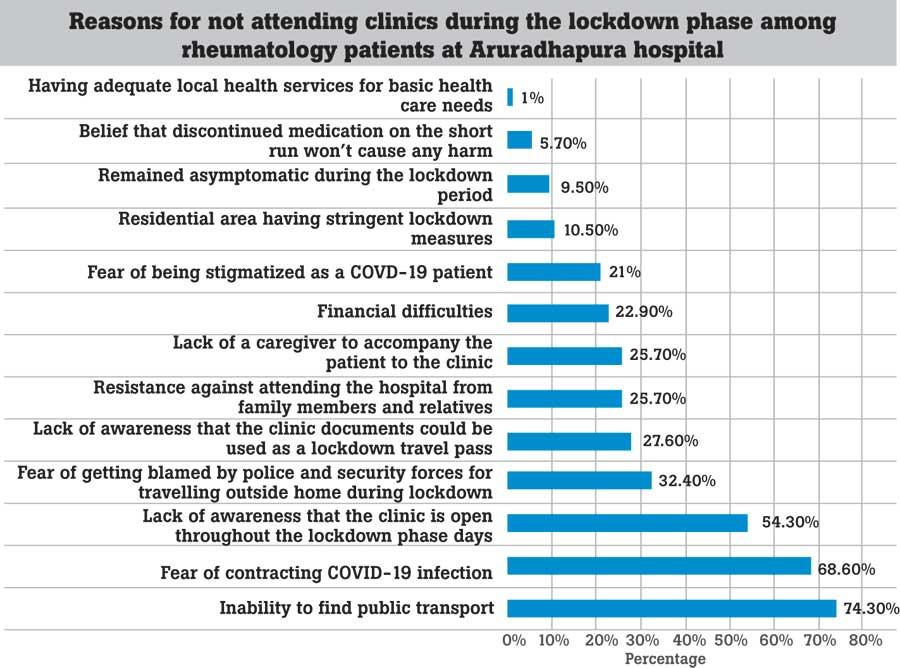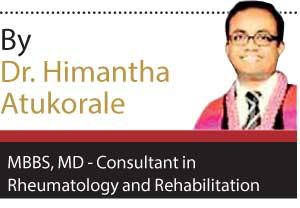Reply To:
Name - Reply Comment

Recently the Daily Mirror reported a death of a male patient at his residence while undergoing self-quarantine. The immediate cause of death was still unclear, but it was mentioned that he had several other medical ailments. This news item highlighted the unfortunate impact COVID-19 had on the excellent health seeking behaviour of our  patients. ? Back in April, I wrote an article titled “Preventing deaths due to non-COVID conditions – A brisk necessity” to initiate a discussion on the danger of non-COVID conditions. I admire the efforts by all the government officials in curtailing spread of COVID-19 at this critical phase. But are we to promote “Stay at home – Suffer at home” concept when the country’s on the verge of a total lockdown?
patients. ? Back in April, I wrote an article titled “Preventing deaths due to non-COVID conditions – A brisk necessity” to initiate a discussion on the danger of non-COVID conditions. I admire the efforts by all the government officials in curtailing spread of COVID-19 at this critical phase. But are we to promote “Stay at home – Suffer at home” concept when the country’s on the verge of a total lockdown?
Poor attendance at Govt. hospitals
We noted a significant drop in patient clinic visits throughout the past two weeks. Fear of contracting COVID-19 might be one reason why patients are reluctant to turn up. A common question posed by my rheumatology clinic patients nowadays is what to do in case of a lockdown. A 70-year-old long-standing patient of ours went a step ahead in asking me of the backup plan in case they ran out of medication! We treat not just arthritis, but a variety of other conditions like elevated cholesterol levels and mild diabetes as patients prefer collecting medication in one go. I think it is important to treat all NON-COVID conditions continuously during the pandemic. There is ample evidence of the value in keeping the non-communicable diseases at bay during the virus outbreak.
I delivered a virtual lecture at Asia Pacific League of Associations for Rheumatology annual congress a few days ago on a research project I carried out at Anuradhapura. It was about the impact of the pandemic on the health seeking behaviour among our patients. If calculated correctly, certain non-COVID conditions have created more fatalities within the past few months globally, than virus-related deaths. But as we, human beings fear death due to a living organism, than death caused by “unseen” conditions such as heart disease and diabetes, the non-COVID deaths are on the rise.
Prof. Yual Noah Harari in his bestseller book “Homo Deus” states the following. In 2012 about 56 million people died throughout the world. 620,000 of them died due to human violence (war killed 120,000 people, and crime killed another 500,000). In contrast, 800,000 committed suicide, and 1.5 million died of diabetes. Therefore he mentions that sugar is now more dangerous than gunpowder!
COVID fear psychosis
It is interesting to analyze why people fear COVID-19 over other non-communicable diseases. Some fear a pathogen that interrupts human to human interactions, than a cause of death like alcoholism that is considered as a part of life. And when certain diseases have definite solutions that we could postpone (medication for high blood pressure) we tend to fear COVID-19 like conditions for which no remedy has been announced yet. The esteem that we have for anything that rapidly came from Far East or the West might also tend to blunt the traditional known causes of mortality.
Health seekers
Health seeking behaviour is any action undertaken by individuals who perceive themselves to have a health problem, in finding an appropriate remedy. Some of our research findings made on disruption of health seeking behaviour during the lockdown are as follows. Inability to find public transport to reach hospital and fear of being infected by coronavirus were given as reasons for not attending the clinic during the lockdown days by as many as 70% of the patients. Fear of being blamed by the police for travelling during curfew, the stigma of being accused on the road as a COVID-19 patient and resistance by family members against visiting the hospital were some of the other reasons that were given by them. We also found that older patients faced more difficulties in attending clinics as they had no proper caregivers to accompany them. Even when having severe disease more than 57% were compelled to stay at home, bearing all the ill effects of the disease. Our research highlighted the need to establish a reliable drug delivery system and an effective communication network during a future lockdown.
Immediate actions
Other than communication methods such as hotlines and posting medication we have to focus on evidence based methods to control non-COVID conditions.
Non communicable diseases such as arthritis, heart disease, lung disease and diabetes are usually controlled by medication. But there are proven lifestyle modifications that bring down the rate of complications due to above conditions. As a country we have attempted to promote these in the past without much success. COVID-19 infection could be considered as a blessing in disguise to strongly implement such “home remedies” of western medicine.
In arthritis, weight reduction with a healthy diet and muscle strengthening exercises are known to bring down joint pain. All it takes is a little effort and the ill effects of over-medication can be avoided as well. For high blood pressure, heart disease and many other ailments, cutting down salt intake is considered very useful. This was given high priority by the WHO and then resulted in a publication Titled – Sodium intake for adults and children. (Downloadable from the web). A diabetic healthy diet is the least preferred lifestyle modification by Sri Lankan patients. But the COVID-19 pandemic might be the best opportunity for diabetic patients to try out this simple remedy. There are many free publications by the WHO on interventions that patients can try out in resource poor settings. I feel that COVID-era is the best time to try out these interventions.
It is well understood that doctors as well as patients have received a hefty dose of anxiety, and fear because of the viral outbreak. In ancient times and during evolution anxiety has proved itself to be an excellent survival strategy for us. But currently, it is considered that our levels of anxiety are no longer proportionate to the actual dangers of living. As a country we have to think rationally and plan ahead in preparation of controlling non- COVID-19 diseases.